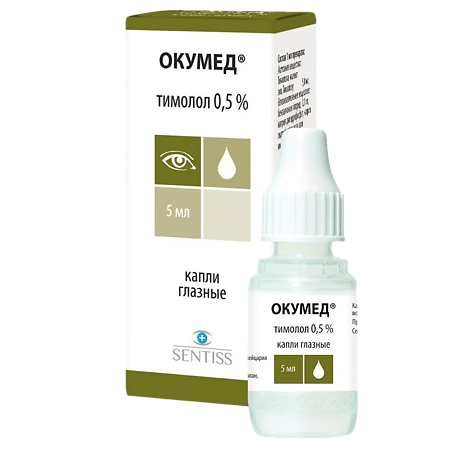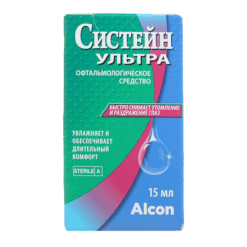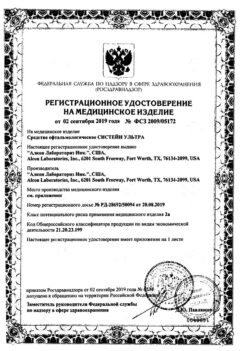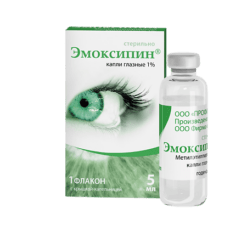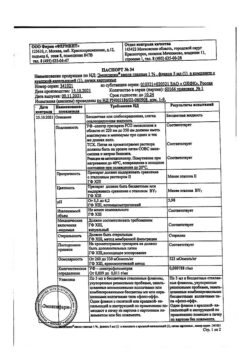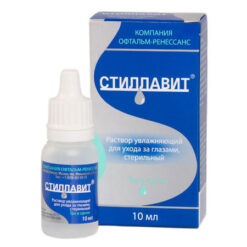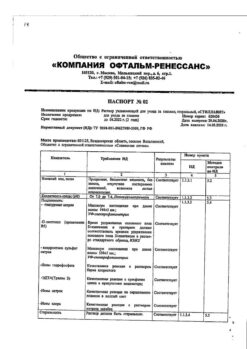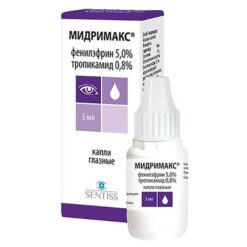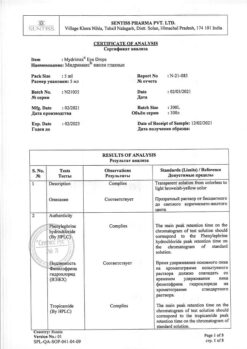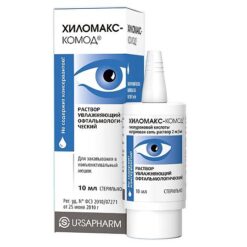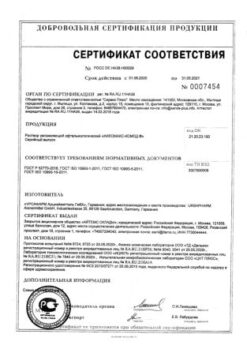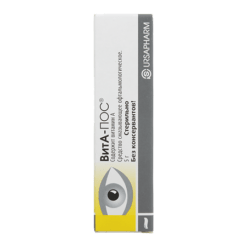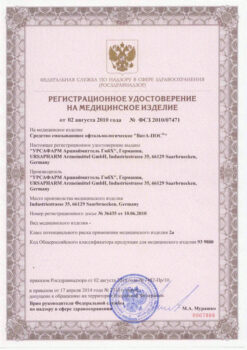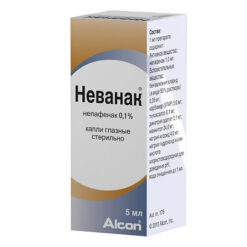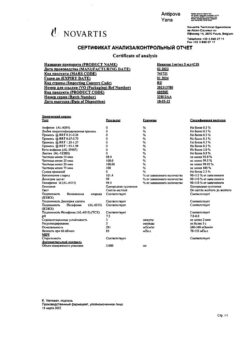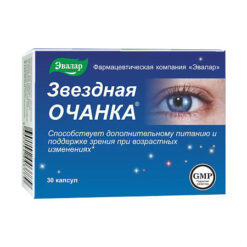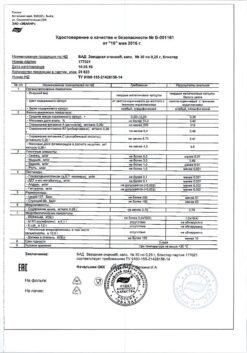No products in the cart.
Ocumed, eye drops 0.5% 5 ml
€2.08 €1.89
Description
When used topically, timolol in the form of eye drops lowers normal and elevated intraocular pressure by reducing the formation of intraocular fluid. The drug does not affect accommodation, does not change the pupil size. Timolol maleate penetrates rapidly through the cornea, within 1-2 hours it is maximally concentrated in the aqueous humor of the anterior chamber. In small amounts penetrates into the systemic bloodstream, excreted by the kidneys.
The action of timolol starts 20 minutes after injection; the effect of reduction of intraocular pressure reaches its maximum within 1-2 hours and lasts for the day. In infants and small children the concentration of timolol in plasma is significantly higher than in adults.
Pharmacokinetics
Intake
Thymololol penetrates rapidly through the cornea when administered topically.
After instillation of eye drops, the Cmax of timolol in the aqueous humor of the anterior chamber of the eye is reached after 1-2 hours.
In a small amount enters the systemic bloodstream by absorption through the vessels of the conjunctiva, nasal mucosa, and lacrimal tract.
Elimination
The metabolites of timolol are excreted mainly by the kidneys.
Pharmacokinetics in special clinical cases
In infants and young children, the Cmax in plasma is significantly higher than that of adults.
Indications
Indications
Okumed eye drops are used for ophthalmohypertension (increased intraocular pressure) as well as for open angle glaucoma, secondary glaucoma.
The drug is effective if other therapeutic measures in the therapy of congenital glaucoma are insufficient and also in angle-closure glaucoma – as an additional means for lowering intraocular pressure in combination with agents narrowing the pupil.
Active ingredient
Active ingredient
Composition
Composition
1 ml of 0.5% eye drops contains:
The active ingredient:
timolol (in maleate form) 5 mg;
Associates:
benzalkonium chloride (0.1 mg/ml),
sodium hydrophosphate,
sodium dihydrophosphate,
water d/i.
How to take, the dosage
How to take, the dosage
Adults and children over 10 years of age are recommended to put 1 drop of 0.25% solution into the conjunctival sac 2 times a day. If this dosage is ineffective, 1 drop of 0.5% solution also twice a day.
When the intraocular pressure normalizes, a maintenance dosage of 1 drop of 0.25% solution once a day is used.
In children under 10 years of age 1 drop of 0.25% solution 2 times a day is injected.
The treatment is prolonged, and it is necessary to change the dosage or recommend a break in therapy.
Interaction
Interaction
The use of Ocumed eye drops together with eye drops containing epinephrine may cause dilation of the pupil. It is not recommended to put two beta-adrenoblockers in the eyes because of the risk of side effects, so the drug is not used with drops containing epinephrine and pilocarpine.
When used concomitantly with calcium antagonists (verapamil, diltiazem, nifedipine, nimodipine, amlodipine, cinnarizine, etc.) or reserpine, slowing of heart rate and increased reduction of blood pressure may be observed.
The use with insulin or oral diabetes medications may provoke hypoglycemia.
The use of Ocumed with neuroleptics and tranquilizers is not recommended, nor is the use of alcohol because of the danger of a sharp decrease in blood pressure.
Forty-eight hours before surgery under general anesthesia, the drug should be discontinued.
Special Instructions
Special Instructions
The patient should be advised to have regular intraocular pressure measurements and corneal examinations and to discontinue use and consult a physician if any side effects occur.
When wearing soft contact lenses, Ocumed Eye Drops should not be used as the preservative in these drops may deposit in the soft contact lenses and have an adverse effect on the eye tissue.
Hard contact lenses should be removed prior to putting the product in and reinserted after 15 minutes.
Patients changing to Ocumed may need refraction correction (once the effects of previous myotics have subsided).
Ocumed should be discontinued 48 hours before surgical intervention with general anesthesia.
Ocumed should not be used simultaneously with antipsychotic (neuroleptics) and anxiolytic (tranquilizers) drugs.
Alcohol consumption is not recommended during the use of the drug (a sharp decrease in BP may occur).
Impact on ability to drive and operate machinery
Immediately after using the drug there may be decreased visual acuity and slower psychomotor reactions, which may decrease the ability to engage in potentially dangerous activities requiring increased attention.
Contraindications
Contraindications
Ocumed eye drops are not recommended for use in case of hypersensitivity to the drug components. The drug should also not be used in case of such diseases in anamnesis as bronchial asthma, severe chronic obstructive pulmonary disease, atrioventricular block of II or III degree, sinus bradycardia, acute heart failure, severe chronic heart failure III – IV functional class, cardiogenic shock. Okumed is contraindicated in allergic reactions with skin rashes, atrophic rhinitis, corneal dystrophic diseases. The drug is not prescribed for infants.
With caution eye drops are used in heart failure of functional class 1-11, arterial hypotension, sinoatrial blockade, pulmonary or cerebrovascular insufficiency, diabetes or hypoglycemia, thyrotoxicosis, pheochromocytoma, Raynaud’s syndrome, myasthenia, as well as in concurrent treatment with other beta-adrenoblockers. Ocumed is also prescribed with caution in children.
Side effects
Side effects
Visually: irritation and hyperemia of the conjunctiva, eyelid skin, burning and itching in the eyes, lacrimation or decreased lacrimation, photophobia, corneal epithelial edema, pitting superficial keratopathy, corneal hypoesthesia, diplopia, ptosis, dry eyes, transient visual acuity impairment, blepharitis, conjunctivitis, keratitis. During surgical interventions for glaucoma a detachment of the vasculature of the eye may develop in the postoperative period.
Cardiovascular system disorders: chest pain, heart failure, bradycardia, bradyarrhythmia, decreased blood pressure, collapse, AV-blockade, cardiac arrest, transient cerebral circulatory disorders.
Respiratory system: rhinitis, dyspnea, bronchospasm, pulmonary failure.
CNS and peripheral nervous system disorders: headache, dizziness, weakness, depression, paresthesias, myasthenia, somnolence, hallucinations, tinnitus, slowed psychomotor reaction rate.
Digestive system disorders: nausea, vomiting, diarrhea.
Allergic reactions: urticaria, eczema.
Others: nasal bleeding, decreased potency, alopecia.
Overdose
Overdose
In case of overdose, effects typical for beta-adrenoblockers may develop – headache, dizziness, nausea, vomiting, cardiac arrhythmias.
The eyes should be immediately flushed with water or 0.9% sodium chloride solution. Further treatment is symptomatic.
Pregnancy use
Pregnancy use
There is no sufficient experience in using the drug during pregnancy and lactation (breastfeeding); therefore, the drug may be administered only when the estimated benefit of therapy to the mother exceeds the potential risk to the fetus or child.
Timolol has been shown to cross the placental barrier and is excreted with breast milk.
Breastfeeding should be stopped during treatment.
Pediatric use
There is not enough experience in using the drug in children; therefore, the drug may only be prescribed if the expected benefits of therapy outweigh the potential risk of side effects.
Similarities
Similarities
Additional information
| Shelf life | 2 years |
|---|---|
| Conditions of storage | In a light-protected place, at a temperature not exceeding 25 °C |
| Manufacturer | Sentiss Pharma Pvt.Ltd, India |
| Medication form | eye drops |
| Brand | Sentiss Pharma Pvt.Ltd |
Related products
Buy Ocumed, eye drops 0.5% 5 ml with delivery to USA, UK, Europe and over 120 other countries.

